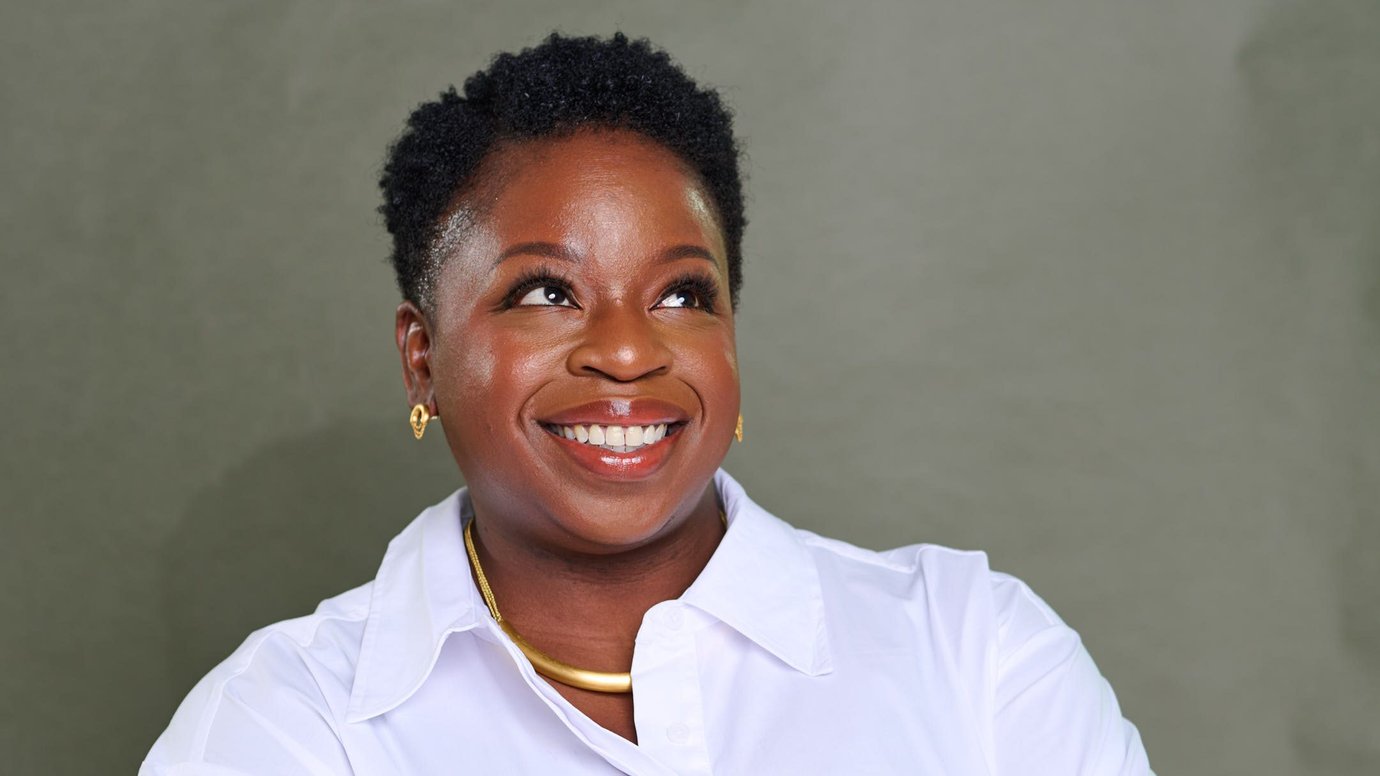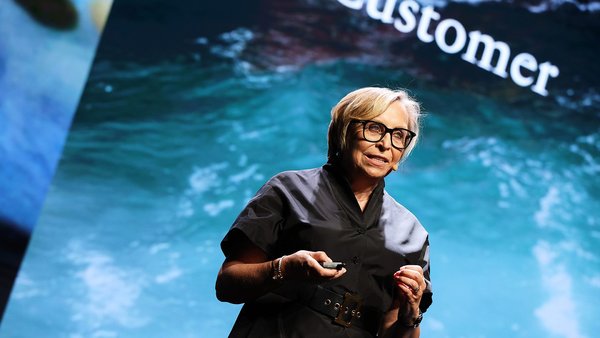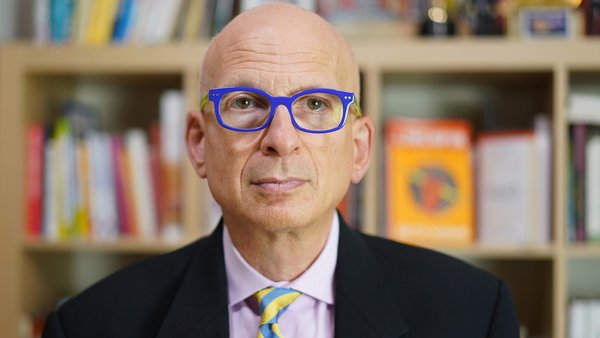‘We hate any display of a lack of courage, especially among the most powerful companies in the world’ /
Marketing strategist Lola Bakare on the commercial impact of responsible marketing and not letting fear override logic

Brands face quite a challenge when it comes to navigating the complexities of political and social discourse – how does a brand acheive broad appeal when people seem so divided? In particular, in America, the push for diversity, equity, and inclusion (DEI) initiatives is facing a backlash from conservatives and President Trump, with some companies retreating from their commitments amidst fears of alienating potential customers.
Yet, as marketing strategist Lola Bakare argues, ‘Logic floats away from people when they allow themselves to be overcome by fear.’ Bakare's timely new book, Responsible Marketing: How To Create An Authentic & Inclusive Marketing Strategy, offers a crucial framework for navigating this challenging landscape. She reminds us that true, sustainable business growth is inextricably linked to authentic inclusion, it’s not a fleeting trend but a fundamental business imperative. ‘If you’re doing it right,’ Bakare asserts, ‘of course, you’re focused on the business outcome as the primary goal.’
In this interview with Contagious, Bakare delves into the practicalities of responsible marketing, explaining how brands can build genuine preference, resist the siren call of divisive politics, and stay true to their values regardless of the prevailing climate – after all, the right business decision is often the right social impact decision.
Jump to key insights /
- Responsible marketing is not abstract – it’s something brands can put into practice
- People are more likely to be interested in your brand if you’re solving a societal problem
- Costco and Apple are great examples of brands sticking to their values in the face of right-wing pressure
- Fear-driven responses back-tracking on inclusivity may seem the smart thing to do but is short-termist
- Underselling responsible marketing efforts is a mistake
- How Trump’s presidency will impact DEI in marketing over the next few years
What is ‘responsible’ marketing and why do you favour this term over others like purpose, inclusive, conscious, social impact, diversity?
The way I define it in the book is, it is marketing that creates a real social impact, that unlocks reputational impact for brands and also creates commercial impact. It’s got to check all of those boxes in order to really be responsible. A lot of the ways of defining it that you mentioned don’t focus on the commercial outcome. And that’s why we get a lot of misunderstanding around why it’s important to eliminate these sorts of efforts to focus on the business. My argument is that if you’re doing it right, of course, you’re focused on the business outcome as the primary goal.
How does a brand become a responsible marketer?
I wouldn’t even think about it in terms of some brands are responsible marketers and some aren’t. It’s about actions. I think of it more in terms of, you are practicing, or you’re not practicing, or you did practice, or you didn’t practice in any particular moment.
So where should a brand start when thinking about practicing responsible marketing?
If you start with authentic social impact – and you could call it just real social impact, if we don’t use the buzz-word authenticity – that’s where you find the places where you should be dancing. Not every brand needs to be involved in every conversation, but what are the historically excluded groups and really urgent cultural causes?
Think about an urgent cultural cause that you need to be involved with because it’s relevant to what your brand offers as its value proposition. That’s where you find the places where you should be focused and then as you test your initiatives. Does it lead to an uptick in your reputation? Do people seem to be resonating with this? That’s one metric, and then ultimately, if that’s true, what you’re doing is likely going to lead to some level of commercial impact that allows you to reinvest in it. And then that flywheel continues.
A good example of this, a campaign that was highly awarded at Cannes Lions is MasterCard’s True Name initiative. It is a great example of a brand looking to aid, support and elevate a historically excluded community, in this case, a transgender community, by solving a problem that they have that is really relevant to the brand.
You create a lot of preference not just with the transgender community, but as the research I did with Sparks & Honey showed [for the Responsible Marketing book], people are more likely to be interested in your brand if you’re solving any societal problem. Because as humans, we want each other to thrive – that’s at our core. That’s in our hearts. It’s so corny, but it starts with love, that’s what connects us all. So if you want to create brand preference, appealing to that is always a great place to start. And by solving problems of people been historically excluded, you have what our mutual friend [marketing professor] Marcus Collins would call the cheat code to get in there.
Do you think marketers strictly have a responsibility beyond driving sales?
That question is an interesting one, because it really is less about that, and it’s more, ‘what are the best ways to achieve a marketer’s primary responsibility of driving sales?’ I see that as the primary responsibility, but I also know that the way to do that is by making an emotional connection. And what’s the easiest way to make an emotional connection? It’s to solve a problem. We talk about unmet needs in marketing a lot, but we don’t think of that in terms of societal problems, and we really should, because that’s the way even the oldest consumer packaged goods companies started.
Unilever, Procter & Gamble, those companies started in the age of the Industrial Revolution, where people didn’t have the accommodation in cities to properly care for themselves, and with no soap, people were getting diseases that were unnecessary and dying in the streets. They realised that commercialising soap would be a way to make a lot of money by solving this problem.
So responsible marketing is just naming something the brands have been doing forever...
Exactly.
There’s a Harvard Business Review article from 2020 , talking specifically about DEI, that questions focusing on the business case for such efforts as it makes them easier to drop when the business is failing.
Here’s the thing: there’s no other practice in business where we judge an entire body of work by its failures. So, of course, there are going to be failures in any initiatives driven by DEI or responsibility, just like there are failures driven by research and development, and things driven by communications. At any level of work in a business, you’re going to have a body of work, a type of work, or function, and you’re going to have successes and failures.
So when you say, ‘judging DEI based on its outcomes financially is going to make companies less committed to it,’ I would challenge whoever said that to really sit and think about what they mean. We shouldn’t be doing anything that’s ineffective in the company. Obviously, if it’s ineffective, we should stop doing it. But that doesn’t mean that we should do away with the function. Maybe the method wasn’t working. But then we think, how else can we better achieve the goal of being diverse, equitable and inclusive, of being responsible. We don’t do away with something because it didn’t work in the first try.
In America the word diversity has become particularly politically loaded, even though the evidence is that more diverse teams create better outcomes. What should a brand do when the political climate is at odds with what we know to be effective?
They should stay the course – 100%. We see a couple brands showing us some early evidence that it’s possible. And what my prediction has always been is that once you tell people you’re staying the course, they celebrate you, and then they kind of forget about you, in the best way. So, Costco is a good example of a brand that came out and said, ‘We don’t actually agree, we’re staying the course. We think that all the things that we’re doing are important, and we’re going to keep doing them.’ Apple followed up with a similar statement.
What happened next? Did people throw away their iPhones? Did people stop going to Costco every single weekend? No. But there’s a lot of lingering talk about the ones who said we’re moving away from our policies, like McDonald’s. You got a lot of press from announcing that you’re divesting [DEI]. Most of it was negative or mixed at best. Staying the course doesn’t seem to create as much of an attention bubble. And beyond that, you get to do the right thing.
Brands that want to prevail for the long term are going to be the ones who don’t buy into anything beyond the principles that they have set out as their values
I found the McDonald’s announcement that they’re moving away from DEI fascinating because they spend the first 75% of [its statement] talking about how all of the amazing DEI work they’ve done has been so effective, and then the last paragraph is like, but we’re moving away from it. In business, when something’s super effective, you double down on it, you triple down on it, you quadruple down on it, until you beat it to a bloody pulp and you can’t double down on it anymore. You can’t squeeze any more efficacy out of it. Logic floats away from people when they allow themselves to be overcome by fear.
We’re all humans, doing our jobs. It’s understandable that in a political climate being so unlike anything we’ve lived through in our this feels very unsettling. Those of us who ground ourselves in history know that this is exactly what happens when a regime that is focused on self-interest and the interest of a small percentage of the population. There are people around [President Trump] who are very invested in maintaining the status quo and ensuring that wealthy contingent becomes even smaller and smaller and more and more powerful. So we’re going to see a lot more propaganda. We’re going to see a lot more distraction. But, what do we also know? We know that the truth always prevails. We know that things tend to come back around to the side of righteousness, and history tells us that as well. And I think we’re going to see the same in this case. So brands that want to prevail for the long term and be around before and after, are going to be the ones who don’t buy into anything beyond the principles that they have set out as their values, and don’t get distracted by trends. And that’s always the case.
In such polarised times, is it difficult for brands to authentically pursue responsible marketing without alienating segments of their audience?
It doesn’t have to be. We make it difficult for ourselves. Costco is a perfect example. I mean, it doesn’t get more heartland than the biggest superstore that there is. To say that Costco doesn’t make their money off the same people that Bud Light was afraid of alienating when they cowered to the response of a few would be wrong. These are the exact same people, but Costco addressed them in the way that makes sense. ‘Hey, we’re about everyone. We’re not getting rid of anything, and we’re standing firm in the course of what we doing.’
Nobody complains, but with Bud Light [they said], ‘We’re so sorry we used a trans influencer. Our beer is for everyone, and we wouldn’t want you to think it’s not for you if you hate trans people.’ Well, that was the reason why there was such a negative response. They told us how they wanted us to respond. They told us that they wanted a negative response. They told us that they weren’t firm in their decision. They told us that they were coming from a place of fear, and just like dogs, humans can smell fear, and we hate it. We hate any display of a lack of courage, especially among the most powerful companies in the world. AB InBev lit themselves on fire.
It’s very easy to do this work if you are firm in your conviction. The problem is a lot of brands and the people running them aren’t. I hate to say it, but you tell people how you’re going to be treated, and they treat you that way. It’s the same thing, you teach people how to treat you as a brand, and you’re the one setting the agenda, you’re the one creating culture, you’re the one in charge. When you let go of those rings, it’s going to go haywire, so you just don’t let go of them.
How damaging do you think McDonald’s DEI rollback is going to be for its brand?
I don’t think it’s going to have an impact on their marketing at all. I think any risk of people not going to McDonald’s when they heard this news is overblown. But that doesn’t mean there’s not a business problem that these sorts of decisions present, what the risk to them in the long term, is that they stop seeking out opportunities to grow the brand that are related to responsible marketing and inclusivity. And so it’s not an immediate risk in the way that you think about in terms of people are going to stop patronising you, but it’s a risk of expanding your market share in the long term. The risks are more hidden, but they’re just as important to consider if you’re a long-term steward of a brand.
You argue in the book that underselling any kind of responsible marketing that the brand might be doing is a mistake. Can you expand on that?
This is one of the things that comes up often, especially with brands that are into a lot of philanthropic work, which is different than marketing work, but often can be something that you talk about in order to create emotional connections with your audience. For example, if you’re a bank and you’re doing something like what Citi Bank did with action for racial equity, there’s a good argument to put that on the top of the funnel, because that storytelling of what your brand is doing can really draw people’s heartstrings.
[But] when you get into the mindset of, ‘Well, if people think we’re doing it to make money, then that means it’s not real’, [then] now you’re just confused because it’s okay for people to always think you’re doing it to make money. Get that out of your head. There’s no purity in this game that we are all in. That’s not what you should be seeking. But what people need to feel is that you’re looking to do things that are positive, and yes, you are financially rewarded for those things. We make those things part of the conversation where they really shouldn’t be.
What advice would you give to brands or people within brands and companies to they start to implement your framework for being a responsible marketer?
Engaging is number one. Have conversations when these questions come up, bring in an expert to discuss a thing that you think you might be on the verge of uncovering, or you think you might be on the wrong side of – just allow yourself to sink into engaging in the issues of the moment as expansively as possible.
The second thing is, don’t be afraid to pilot programmes and try things. That fear is what will always hold you back, but if you remind yourself that you should have the same capacity for risk taking with this work that you do with new flavours and innovation and things that we’re used to taking a risk on, that we know might hit or miss, then you understand that it’s not about being perfect to start, but it’s about being willing to try. You’re never going to hit it out of the park and hit on the three imperatives of real social impact, real reputation impact, and ultimately result in commercial impact. [But] you’re never going to get there if you’re not willing to try and experiment.
Can you think of any particular brands that are bold enough to experiment, get things wrong and keep going?
My alma mater, PepsiCo, is a great example of that. Pepsi gets brought up almost every single time you have a conversation about disastrous failures and responsible marketing with that Kendall Jenner ad, right? But we all also know that that doesn’t define them at all. If we listed responsible marketing campaigns and initiatives of the last 20 years, and even going back even further, they’d be on the list every single time.
One that I love is the Dig In initiative [to support Black-owned business]. This was both something that attacked economic equity, this attacked racial equity, and also was a great commercial initiative for them. The Dig In initiative helped Black restaurants stay in business during the pandemic. You can have a disastrous ad, but you keep rolling with different initiatives that make sense and that are grounded in commercial activity, and you don’t let that stop you.
What are your hopes and expectations for the practice of responsible marketing in the next five years, particularly in America, with Donald Trump as president?
Maybe it’s youthful optimism, but I think truth and righteousness will prevail, and brands that continue to be themselves at their core who they really are, their best, most responsible selves. We talk about responsibilities being behaving as the best version of yourself, that’s a practice that takes effort. My hope is that that brand stewards – the people who are leading the most impactful brands in the world and the brands most capable of creating culture that is positive – see the value in showing up to do that work.
As marketers and as business leaders you want to be in the world of what’s ‘happening’. I hope people focus on making things happen, as opposed to making things not happen. Because that’s the most pro-business mindset you can possibly have. Right now, we’ve been seeing a lot of focus on the ‘not happening’ of it all, and that is counterproductive.
So I hope that people stay optimistic and aware of their power, and continue to see their power as a privilege and not something that should feel burdensome. Your power as a brand leader is a privilege, and if you think of it that way, then you should be willing to do the little bit of extra work that put out that bit of extra effort that it might take to wield that power responsibly so that you can hold on to it in the long term.
Want more of the same? /
We don’t just write about best-in-class campaigns, interviews and trends. Our Members also receive access to briefings, online training, webinars, live events and much more.







